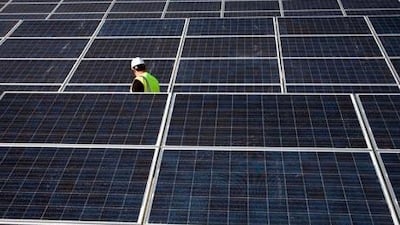In a desert far from the Arabian peninsula, the world's biggest concentrating solar power (CSP) project has run into unexpected opposition ? from environmentalists. Spurred on by pledges of financial support for renewable energy from the US government, electrical utilities in the country's arid south-west have been acquiring huge tracts of desert on which they hope to harvest sunlight to generate electricity.
It is a development that many environmentalists concerned about climate change applaud. But others are horrified by the damage that such projects could cause to delicate ecosystems. Basin and Range Watch, a group of volunteers dedicated to preserving the deserts of California and Nevada, is one of several environmental organisations campaigning against BrightSource Energy's US$2 billion (Dh7.34bn) 500 megawatt (MW) solar project on 4,000 acres of public land near Death Valley, in the Mojave Desert.
The Californian firm has already secured a deal to supply 1,300MW of power to the utility Southern California Edison from solar projects it plans to develop in the region. But installing an array of 318,000 parabolic sun-tracking mirrors at its Ivanpah site, near California's border with Nevada, would involve "extensive grading and removal of existing desert soils, resulting in the potential for increased erosion", Basin and Range Watch claims.
Herbicides would be sprayed to keep weeds down, and waste from the project would contain "mercury, lead, cadmium, copper, and other substances hazardous to human and environmental health". "In other words, this will be an industrial site, not a green project," the group says. An even bigger worry to the opponents of such developments is that they would slurp up scarce supplies of groundwater from aquifers beneath the desert, threatening the water supply tapped by some deep-rooted desert plants and used for irrigation by local farmers growing fruit and vegetables.
Unlike photovoltaic solar projects, which turn sunlight directly into electricity, CSP harnesses the sun's rays to boil water, producing steam to drive turbines. The steam must then be condensed back into liquid for re-use in the plant's boiler, usually with the help of additional water for cooling. Other concerns are that roads and construction activity would disrupt habitats for desert animals, including endangered species such as desert tortoises.
Then there is the threat of dust storms resulting from damage to biotic crusts, the sensitive networks of algae, bacteria and lichens that can be destroyed simply by walking on them. "They don't extend more than a few millimetres below the surface. Just by being there, they hold the dirt and silt in place," says Darren Sandquist, a biologist at California State University in Fullerton. "It's certainly going to damage some of the ecology," he says of the power projects.
"I think that's a trade-off we have to accept. It's part of becoming less reliant on oil, and more on solar and wind power." In Abu Dhabi, officials at Masdar, the Government's renewable energy company, have also been pondering this trade-off as the company proceeds with plans to develop the emirate's first CSP project, the 100MW Shams 1 power plant scheduled for start-up in 2011. Ziad Tassabehji, the company's director of utilities and asset management, says Masdar favours dry cooling, which uses up to 25 times less water than standard wet cooling designs.
That is not an easy engineering proposition in the scorching Arabian Desert, but efficient new technology for drawing air through cooling towers is already in use at some large thermal power plants. Masdar is working with the UAE's Environment Agency to ensure minimal disruption to the ecosystem, and it will not be spraying herbicides. Instead it plans to grow grass beneath the reflectors, which will be watered when the mirrors are cleaned.
As for dust storms, Abu Dhabi's sand is very fine, and the compacting process during the site's development can create a thicker surface crust, Mr Tassabehji says. @Email:tcarlisle@thenational.ae

